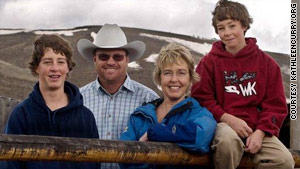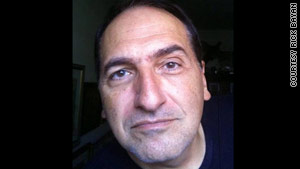The Sweep: Vikings, voters and the charge of the Militant Middle
Tom Foreman
CNN
Washington (CNN) -- This is a political story, complete with angry voters, a frustrated candidate and a scholarly observer or two. So if that's what you're after, take heart.
But I'm going to start a long time ago. With the Vikings. Pointy metal hats. Horns. Dragon ships. Those Vikings.
The Vikings did not meet many foes willing to stand and fight, but when they did, they had an answer: born-and-bred sociopaths called berserkers. Stripped of armor, with a sword strapped to one hand and a battle axe to the other, the berserkers would charge into the opposing force like human wheat threshers, spreading carnage and terror as long they survived. The result was dramatic and demoralizing, and as the enemy fled, the rest of the Vikings swooped in to complete the massacre.
Which brings us to the Tea Party. Despite all the headlines about their impact on the upcoming midterms, I have a theory that out in the political heartland, the trashing by the Tea Partiers may be preparing the battlefield for a much more profound second wave of disaffected, independent voters, who could make the Tea Party look like, well, a tea party.
I've always called them the Militant Middle, and Gary Butts is a founding member. "It's about time the moderates stood up and said, 'Hey, we're in the majority here!'"
He is with ModerateVoters.org, based in Irvine, California, and he says the Militant Middle started growing and coalescing around a broad slogan of "Throw the bums out" long before the Tea Party even started brewing -- and now it's reached a boiling point.
He's not alone. Comedy Central's Jon Stewart stirred the waters with his call for a Million Moderate March on Washington the day before Halloween to "restore sanity."
Stewart tells his devoted audience, "We live in troubled times with real people facing very real problems; problems that have real if imperfect solutions that I believe 70 to 80 percent of our population could agree to try and could ultimately live with. Unfortunately the conversation and process is controlled by the other 15 to 20 percent."
Stewart is putting serious weight behind his words, hosting a week of "The Daily Show" from Washington leading up to the event. His comrade-in-charms, Stephen Colbert, is also jumping in with a tongue-in-cheek counter-rally -- a March to Keep Fear Alive.
On a more serious front, New York billionaire Mayor Michael Bloomberg has been hopping around the country lending his support to Democrats and Republicans with a moderate streak, convinced they hold the key to breaking the death grip of the partisans.
Such high-profile efforts are thrilling for Butts. As a young man, he was a page in the U.S. Capitol, and worked alongside and observed a master of mutual respect and bipartisan cooperation -- so much so that the man's colleagues on both sides of the aisle rallied behind him to be president of the United States in one of the nation's darkest, most divisive political hours: Gerald Ford. No wonder Butts finds the politics of today maddening. "I think people are sick and tired, and some of us in the middle are just horrified at the noise coming from the left and right."
There is also serious political science behind this notion. At Stanford University, Morris Fiorina is a professor who theorized well before many others that this rising middle was becoming a major force in American politics. Some of the political intelligentsia back east initially -- and some even now -- dismissed the idea.
"I take some satisfaction in being right," he says, with a faint chuckle. His best evidence that his prediction was spot on: President Obama, elected largely by independents and moderates who were furious at Republicans, yes, but also at the status quo and the deeply divisive politics practiced by the two main parties. "In part, Obama was elected on a promise to change the tenor of politics and it hasn't happened at all."
That has further fanned the flames of anger for the Militant Middle. In Philadelphia, Rick Bayan runs a website called The New Moderate, and he voted for Obama. "I thought he'd bring the kind of change I wanted. I thought he'd be another JFK, and it's been just the opposite. He's like an economics professor. He's a lot more establishment than I thought."
So day after day, Bayan now urges anyone who will read his online columns to join the bulging center of the electorate -- especially political types who might emerge as legitimate contenders. He has learned that electing one agent of change, no matter how powerful, just won't cut it. "We need more forceful, dynamic leaders," he readily admits of the movement. "Most people perceive moderates as timid, middle-of-the-roaders, who can't take a stand."
 State Representative Kathleen Curry, pictured with her family, was a lifelong Democrat who ditched her party.
State Representative Kathleen Curry, pictured with her family, was a lifelong Democrat who ditched her party.
If they met state Rep. Kathleen Curry out in Colorado, they might not feel that way. She is precisely who Bayan is looking for: a successful, winning politician who has joined the independent cause. "I don't like the two-party stranglehold on votes," she tells me by phone from her office deep in the Rocky Mountains.
Curry was a lifelong Democrat when she was elected to the legislature six years ago, and a rising star in the state party as she was re-elected three times. Then last December she shoved the party aside. She was tired, she says, of party leaders who thought she should listen to them more than the folks at home.
"I have a diverse constituency," she says. Some voters on the right, some on the left, a lot in the middle. She was committed to serving them all, and convinced the two party system was designed to keep her from it. "It's hardwired to promote the interests of the two parties. And they're good people, but they're not motivated to change a system that keeps them in power."
Part of the problem cited by everyone I talked to is the primary voting system. Despite some highly publicized upsets, in most cases the parties still steer the early selection process toward faithful partisans. Such candidates are easier to raise money for, easier to differentiate from the opposition in ads, and more likely to do precisely what moderates do not want: Toe the party line.
The parties defend the practice by saying the electorate itself is polarized. But Fiorina says it is a self-fulfilling assessment. "You give people nothing but polarized candidates and you get polarized voting."
"Our voters," Curry adds, "are not being reflected at all."
 Rick Bayan says Obama is "a lot more establishment than I thought."
Rick Bayan says Obama is "a lot more establishment than I thought."
Just outside of Washington, FairVote.org is trying to do something about that. Rob Richie is the executive director of the nonpartisan, nonprofit organization. He says fewer than half the states have open primaries in which anyone can help pick the nominees. He is fighting for a wider variety of candidates everywhere, and respects the challenges for independents once polling begins. "I can sympathize with where they are coming from. If you don't start off higher than 30 percent, you're demonized as a spoiler."
Hitting that mark demands buzz in the talk circuit, and that's tough to generate with a moderate message of gradual change, responsible spending and taxes, and a steady hand at the policy wheel. Bayan, a former advertising man, puts it more pointedly. "Nuance doesn't sell."
"So what you need is extremist moderates?" I ask.
"Ha!" Bayan laughs and then concedes, maybe so.
Fiorina admits that measuring the power of independents and moderates is tough because by definition, they don't sign up for party pot luck suppers. But they are, he believes, nonetheless united by an ethos.
"There is a moral thing here," he says. "Moderates believe good behavior should be rewarded and bad behavior punished."
That's why bailouts of the banks, Wall Street, and the big automakers made them so angry. He adds that other characteristics of independents are a belief that the two major parties are putting their own good above the good of the nation and that the political deck has been horribly stacked against the voters in the middle.
"They're right," says Curry, who despite her successful six years in office will be re-elected this fall only if enough Colorado voters write her name in.
Independents face hurdles that the two parties long ago knocked down for their own players, in terms of getting onto ballots, obtaining government campaign funding, being included in debates. The parties argue that they have been the vanguard of politics in this nation for many generations; they have earned certain privileges. But what I've heard from countless de facto members of the Militant Middle for several years now is, "We're fully a third of the electorate, and yet the gatekeepers from the parties keep us from being represented anywhere. How is that democracy?"
Still, there is also an intangible. The roughly one-third of voters on the left and one-third on the right often seem almost unable to comprehend what the middle wants.
"I'm just sick of hearing about the independents," a friend in New York told me some years ago. "They need to make up their minds."
What she did not seem to grasp is that they have. The independents I have met over the years, all of whom espoused generally moderate views, are often deeply concerned about politics, dedicated to their communities and their country, and utterly convinced that choosing either party is a mistake -- a kind of willful decision to ignore the possibilities and ideas offered by all Americans by joining a club composed of one slice of the country. Simply put: Partisans see independents as wishy-washy. Independents see partisans as blind.
So even as the parties mow down their own moderate voices, people like Gary Butts keep beating the drum. "If moderates really turned out in volume in primaries, we could get good moderate candidates."
It is worth noting that no one I talked to for this story seemed particularly interested in joining the Tea Party movement. But in a way, many seemed grateful for it. Because call them patriots, troublemakers, or berserkers, the Tea Party is giving both parties their first real scare since Ross Perot snatched up more than 18 percent of the presidential vote in 1992. And the Militant Middle thinks that could help.
Never mind that some Tea Partiers are virulently anti-moderate. As Democratic strategist and CNN analyst Donna Brazile told me, "The Tea Party is going to knock out the moderates in both parties."
The Militant Middle believes the nation overall is so moderate, and the moderates are so ready to be roused, that the Tea Party can't last. And they think once the rampage is over, both major parties may be so battered that they'll be more than willing to strike a deal with the middle to prevent a new uprising.
It's a long shot. It may be a pipe dream. But listening to all of them, I am reminded of one of my favorite sayings: Beware the fury of a patient man. The Militant Middle has been patient a long time, and with each failure of the two parties to repair faith in government, restore the economy, and get Washington working properly again, their fury grows.
They're just behind the berserkers, sharpening their swords and waiting to charge.
Originally posted at http://edition.cnn.com/2010/POLITICS/09/29/foreman.militant.middle/
